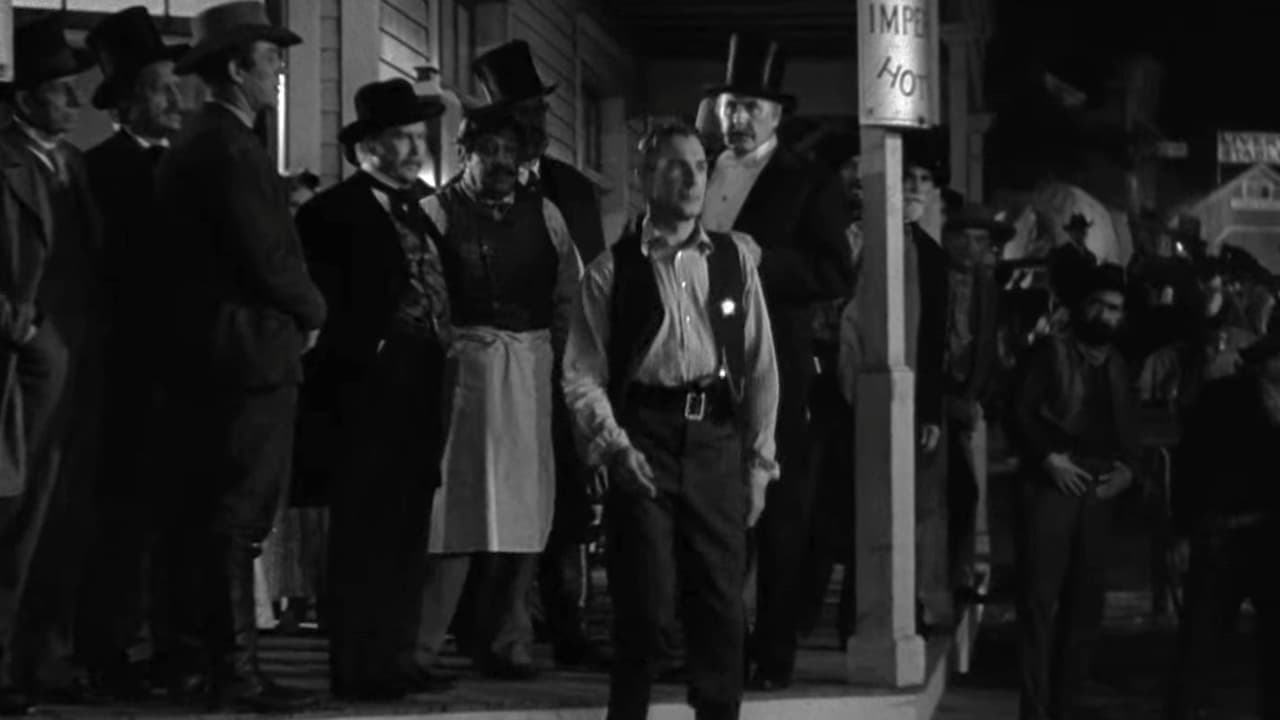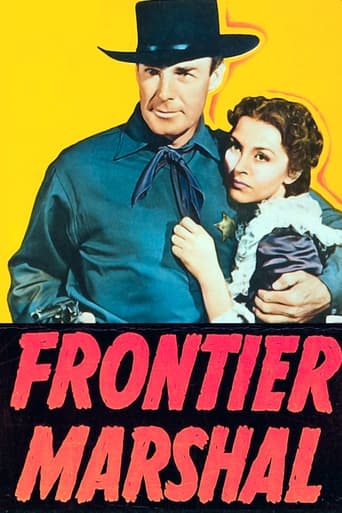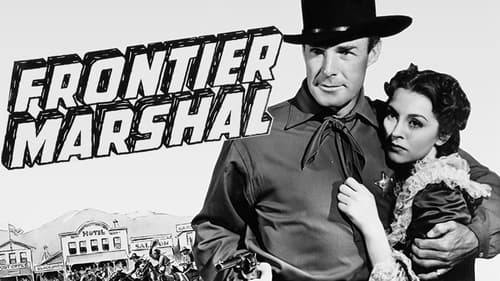


Early version of the Earp-Holliday, OK Corral legend.Thanks to big-budget TCF, this is a well-produced, mid-level Western. Those barroom scenes along with the crowded streets are high energy and appropriate to a boomtown, which Tombstone was. Dwan directs these scenes with flair. Can't say the same for the final shootout that is poorly staged and fleetingly done as if the production had to hurry up to meet schedule. Ford's 1946 remake My Darling Clementine greatly improves on that final showdown with the kind of close-ups and structured tension that're needed.Scott and Romero cut formidable figures as the legendary heroes. The screenplay suffers, however, by failing to spotlight an equally formidable villain to challenge them, spreading the villainy instead across several minor players. Too bad the impressive Carradine is largely wasted in an incidental role. On the other hand, Kelly is very pretty as the good girl, while Barnes shines as the good-time girl. I like the way their rivalry evolves over time.I can see why the estimable John Ford saw so much potential in the characters and story. There's a lot of color in the array of personalities and rivalries, including the show biz Eddie Foy Jr., an entertaining contrast to the frontier types. Of course, Ford's version is clearly superior. Still, this 1939 entry remains a respectable little Western with its own modest merits.
... View MoreThat would describe Wyatt Earp. Lucky because I can't think of anyone else who's had more stalwart Hollywood heroes playing him in film. Off the top of my head Tom Mix, George O'Brien, Henry Fonda, Burt Lancaster, James Garner, James Stewart, Joel McCrea right down to Kurt Russell and Kevin Costner. We certainly can't forget Hugh O'Brian on television. And also Wyatt was lucky in that he lived long enough so that no one was around to refute him when he gave a series of interviews to Stuart Lake for an authorized biography shortly before he died in 1929.As this film is based on Lake's book you won't get anything else but the Wyatt of legend. Certainly Randolph Scott fulfills the legend and that's what we print according to John Ford.This film isn't too often seen because whole parts of it were taken and used by John Ford in My Darling Clementine. Frontier Marshal should be seen back to back to graphically illustrate the difference between a good routine action western and an almost poetical film expression. Parts that were played by Victor Mature, Cathy Downs, and Linda Darnell in My Darling Clementine are taken here by Cesar Romero, Nancy Kelly, and Binnie Barnes. It might seem odd that British Binnie Barnes would show up in a western as a saloon girl, but that's no more strange than Marlene Dietrich doing the same that year and being very accepted.Eddie Foy, Jr. is in the cast playing his celebrated father who was entertaining in Tombstone at the time the Earps were providing law and order. The Clantons believe it or not are completely eliminated from the story. The chief villain is real life Clanton retainer Curly Bill Brocius played here by Joe Sawyer. Eliminated also are Wyatt's brothers and as you can imagine the final shootout at the OK Corral is staged differently than in any other telling of the tale. Probably Randolph Scott's Wyatt Earp would be a lot better known had he the benefit of John Ford's direction.
... View MoreThere is no way but to compare Frontier Marshal with My Darling Clementine. Charles Stevens plays the same part of the drunken Indian in both films. The story in both films comes from Sam Hellman and Stuart N. Lake. I liked Cesar Romero as Doc Holliday more than Victor Mature. Eddie Foyt Jr playing his father adds to the film more than the Shakespeare of Clementine. As for the women, Nancy Kelly and Binnie Barnes seemed better than Cathy Downs and Linda Darnell in Clementine. Randolph Scott has one of his best performances as Wyatt Earp. John Ford and Henry Fonda had greatness in them, it is impossible for Scott and director Allan Dwan to compete with that, but they made quite a good western very enjoyable even nowadays. In his version Ford added a touch of poetry, also he was more technical in the sequence of the gunfight. Frontier Marshal is a must for all those who think they have already seen everything about Wyatt Earp and the O.K.Corral.
... View MoreRandolph Scott, as Wyatt Earp, rides into Tombstone thinking about starting a stagecoach line. But Indian Charlie, drunk, starts shooting up the local saloon. The local marshal (Ward Bond) is afraid to go in and roust Charlie, so Earp dons a badge, goes in and drags him out by the feet. Earp becomes the full-time marshal. He meets Doc Halliday (Caesar Romero), a tubercular physician, gambler, and gunman, and after an initial wary brush, the two become more or less friends. Romero has a local trashy girlfriend (Binnie Barnes) whom Scott has to dump in a water trough. Doc gets liquored up, pulls his gun at the bar, and Earp knocks him out to save his life. An old flame of Doc's (Nancy Kelly) shows up in town, having pursued Doc all across the West, but Doc dumps her unceremoniously because he loathes what he's become. He redeems himself, however, by saving a badly wounded patient, only to be killed by Curly Bill and his gang as he walks out of the saloon door. There follows a shootout at the OK Corral in which Scott makes mincemeat of the bad guys. Binnie Barnes leaves town on the stage, and Kelly stays behind, probably not unaware of the moon eyes Scott has been casting her way.Sound at all familiar? Seven years later it was remade as John Ford's "My Darling Clementine." It isn't a bad movie, better than the majority of Westerns being made at the time. Yet one can't help wondering what makes Allan Dwan's "Frontier Marshal" an above-average Western and Ford's "My Darling Clementine" a classic.Small things first. Dwan's movie is short on creativity in the wardrobe and makeup departments. Like most of the other principals, Scott dresses in an echt-1939 suit, only with a cowboy hat and gunbelt. The women's makeup dates badly, with dos out of the late 1930s and pencilled eyebrows and big lashes. It isn't that "Clementine" is extremely good in those respects -- it's just better. The photography and location shooting don't reach the bar set by "Clementine" either. The photography isn't bad at all but it hardly fits into a Western frame. Almost the entire movie is shot at night, with no more than a handful of daylight scenes. The location isn't Monument Valley but it is, after all, Movie Flats which has been used expressively before. Here, it's not really present in any utilitarian sense because you can't SEE it at night.Acting. Caesar Romero is probably as good as Victor Mature was in the later version. Binnie Barnes and Linda Darnell (in the same hooker role) are equally good, although they give us two quite different versions of what a hooker is like. Barnes is older, tougher looking, a bit treacherous. Darnell is younger, more Hispanic, tousle-haired, tempestuous, and childish. Scott is a competent actor, but Fonda is on the other hand outstanding. Throughout "Clementine" Fonda wears an expression that has something of puzzlement in it. When he whacks a guy over the head with the barrel of his pistol, he looks up from the unconscious body as if he's slightly surprised at what has happened and hasn't got a very clear idea of what's going to take place next. Above all, there is the difference in direction. Dwan was a forthright story teller, a pioneer in the movies, and he does a good job. But Ford goes beyond the story, almost into visual poetry. "Clementine" has not only the family, but two opposing families, which gives the characters added depth and more intense motives. "Clementine" also has the familiar Ford opposition between the wilderness and the garden, which in Dwan's film is given very short shrift indeed. There is nothing in "Frontier Marshal" like the scene in which Fonda escorts Cathy Downs to the half-built church and awkwardly dances with her. What a celebration of community. Dwan's story deals with individuals who have conflicting ideas of how to get ahead. A couple of people know one another but there is little sense of a "town" in Dwan's movie. I won't go on about Ford's touches of roughhouse humor except to mention that they add another element lacking in "Frontier Marshal." There's an intentionality behind these brief incidents. Instance Fonda's dance with his feet against the porch post, or Darnell throwing a pitcher of milk in Ward Bond's face after he whinnies at her. Still -- allright, so it's not a classic. But "Frontier Marshal" is better than most. And it's worth seeing for its historical value, a kind of lesson about how to make a good movie into a very good movie indeed.
... View More